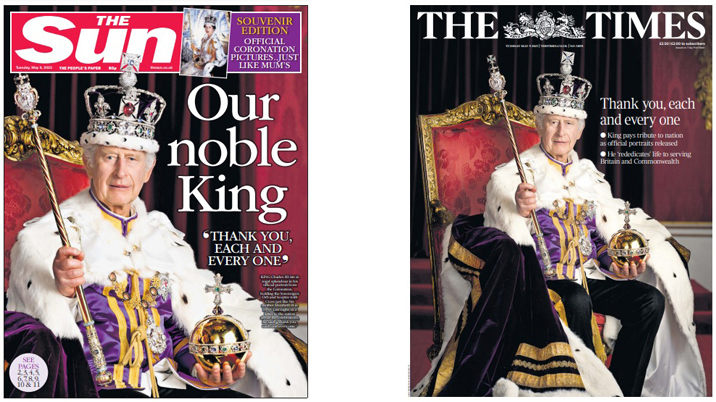
Reedy’s rule
As editor of the Birmingham Post in the late 70s and early 80s, Jack Reedy had a mantra that has turned into something of an earworm of late: the important decisions you make when putting a paper together are not what to put in, but what to leave out. There had to be a very good reason not to put a story in the paper and you needed to be able to defend that decision in the public forum.
I remember not only the dictum, but also one example of failing to follow it that brought the ceiling crashing down on me. It was a “good news” story about British Leyland, one of the region’s biggest employers and also the symbol for the Thatcher government of all that was bad about British industry – a recalcitrant workforce, continual unrest and strikes blamed on “Red Robbo” and his pals, a failure to turn a profit, requiring constant bailouts from the public purse. Any or all of that may have been true, but it was seen as a basket case. Anyway, on this occasion, something – the details escape me now – had gone right. So right that it led the BBC news and even the nationals, which were always putting the boot in, made a fuss about it. I didn’t. The story was in the paper, but not screaming at readers from the front page.
“What were you thinking of?” deputy editor Peter Saunders demanded over the phone at 7am. The anger hadn’t dissipated by the time I reported for my shift at lunchtime. “We run bad news stories about BL day in, day out. They are constantly on at us about it. And then, when there’s something positive, we bury it. How can we defend that? How can we explain that to the people who work there? How can we justify ourselves?”
Ouch!
Other stories that had seemed more compelling the night before suddenly lost their lustre. It was easy, in the cool light of day, to see now where the BL report could and should have gone. But at least it had been in the paper. Reedy’s mantra was more fundamental: it was the stories that were left out that concerned him. When making choices, we needed to be aware of the risks of people accusing us of bias, of bowing to vested interests. It was a salutary – and daunting – lesson because there were always a lot of stories left out. That is the nature of print journalism: there is always too much copy and too little space (apart from on bank holidays).
Reedy’s Post, under Iliffe ownership, was a Conservative paper. As Conservative as the Times or FT or Telegraph at the time – the papers he liked to see as our rivals (he expected national newspaper standards on a provincial newspaper budget). But news reporting had to be straight down the line; the paper’s political stance should be in evidence only in its opinion and editorial columns.
Most of the nationals abandoned that approach years ago; “attitude” that was once constrained to the splash heading has bled across the entire news output of some titles, both left and right. But now we have moved to the next stage, the blatant abandonment of the Reedy rule, so that stories are suppressed seemingly without compunction.
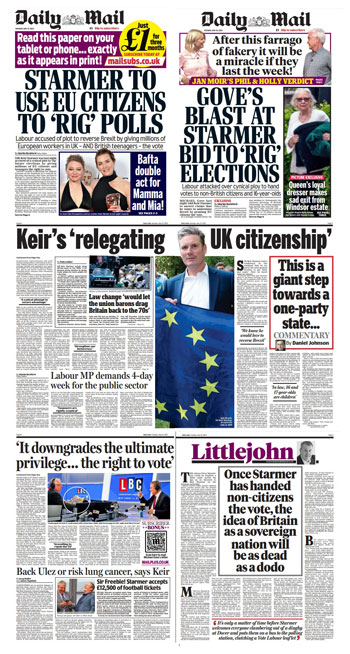
For three days this week, the Mail has been accusing Keir Starmer of planning to “rig” elections by extending the franchise to younger people and some immigrants - following up on a Sunday Telegraph lead. It was the splash and a spread on Monday and Tuesday, and an inside page yesterday. Most other papers have reported the policy, but none has been as indignant about it.
The Mail, in common with others, has also been reporting on two gatherings of groups attended by Conservatives who can reasonably be described as being on the Right of the party. Starmer’s reported electoral reforms were unwelcome, with Lord Cruddas telling the first convention that they would make it almost impossible for the party to win an outright majority; Britain would become a country of coalitions. That’s one way of looking at it and Cruddas is entitled to his opinion.
But then, at the second gathering, Jacob Rees-Mogg weighed in to tell his colleagues not to worry too much. This is what he said:
“Parties that try and gerrymander end up finding their clever scheme comes back to bite them – as, dare I say, we found by insisting on voter ID for elections. We found that people who didn’t have ID were elderly and they, by and large, voted Conservative, so we made it hard for our own voters and we upset a system that worked perfectly well.” He later told the BBC: “I thought people assumed it would help get more Conservatives out, and it actually did the opposite.”
So – not once, but twice – a man who sat in the Cabinet that created the law, and later defended it as being there to combat fraud and protect democracy, virtually admits what critics had said all along: that the measure was intended to help his party. That is pretty jaw-dropping stuff.
Sufficiently jaw-dropping for Labour MP Dawn Butler to raise her “serious concerns” in the Commons and to seek advice from the deputy speaker as to whether she should report Rees-Mogg to parliamentary standards officials or the police. She was told to “leave it there”.
The Times, alone among the nationals, reported Rees-Mogg’s speech properly. The i mentioned it in passing, the Mirror nodded to it in Fiona Parker’s column through Jon Sopel’s “tweet of the day”, and some regionals picked up on it, but that was about it in print. There was more online, including from the Independent, the Evening Standard, and freestanding news sites. Byline Times combined the comments with its own research that suggested up to two million people had been deterred from voting in the local elections by the photo ID requirement (that does seem a very high estimate – and voter apathy at local polls is legendary). No print edition reported what Dawn Butler had to say.
That seems to be a pretty bad miss on the part of all the papers that gave those conferences a good show, but it was particularly egregious of the Mail not to report the comments – which, remember, were not off-the-cuff remarks, but came from the platform in a set-piece speech – in seven pages of “election rigging” coverage over three days.
Harry’s trials: selective reporting continues
Flouting of the Reedy rule is not the sole prerogative of the Mail, however. Most of Fleet Street has been at it with regard to a certain absentee member of the royal family. We have already seen how the preliminary hearings of the Duke of Sussex’s cases against the Mail and Sun were ignored or played down. Now we have moved on to a real trial, has the picture changed at all? What do you think?
Harry is now suing the Mirror for phone hacking in a trial expected to last several weeks and at which he is due to give evidence next month. On day one, the Mirror group admitted one instance of illegal information gathering “worthy of compensation” at the People for which it apologised, and the prince’s lawyer, David Sherborne, told the court that it was inconceivable that, as an editor, Piers Morgan did not know that his journalists were obtaining information illegally.
It so happened that on the same day (coincidence?) Morgan gave an interview to Amol Rajan for the BBC in which he stated that he was unaware of hacking at his papers (he was editor of both the Mirror and News of the World), that he didn’t know how to hack a phone (even though he wrote about how to do it in his autobiography and reportedly explained the method to a Blair aide), and that he wasn’t “taking lectures” from Harry and Meghan on invasion of privacy because they were serial invaders of the royal family’s privacy.
Morgan moved on to television success in America and when he returned, he co-hosted the Good Morning Britain breakfast show with Susanna Reid for ITV. He now writes a column for the Sun and is a presenter for Murdoch’s Talk TV. You could fairly say he was a well-known personality. Combine that with the fact that Mirror Group Newspapers have paid out millions in phone hacking damages and the frequent attempts to link Morgan to that hacking, and you would imagine that a case finally coming to trial aiming to get to the bottom of what went on at the Mirror would be of great public interest.
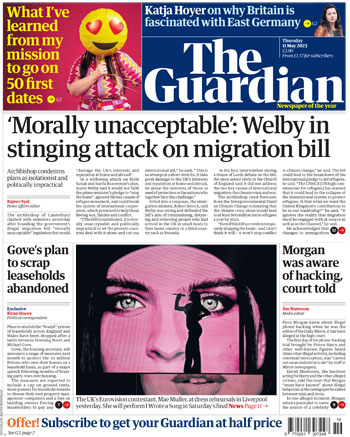
So, what did our papers make of all that? Apart from the Guardian, only the i and Telegraph had anything on the front, in each case a puff. The i took the “Morgan knew” line, while the Telegraph went with “Morgan mocks Duke”. The FT had the earliest inside coverage with a five-column page 2 story headlined “Mirror accused of industrial scale illegality”. Everyone else was far more interested in having a go at the Archbishop of Canterbury and pushed the story back as far as they dared. The Sun, Express, Mirror and Star all went on the apology, while the Times and Mail majored on the defence line that stories Harry claimed were the result of hacking had, in fact, been fed to journalists by members of his family and royal courtiers.
As for declarations of interest, the Times mentioned Morgan’s current role with Talk TV and listed Harry’s other cases against the Press, but did not note that the Sun, for which Morgan writes, is a News Corp stablemate. Meanwhile, the Sun failed to say that it was also being sued by Harry. The Express quoted a Mirror spokesman as saying “MGN is now part of a very different company”, but did not add that that company was Reach, owners of the Express (and Star).
Only the Guardian, Times and Mail bothered to print anything about day two of this trial, when Sherborne told the court that Morgan “lies at the heart” of the claims. The Times and Mail both led on the Mirror contentions that stories put down to hacking might have been leaked by a Palace aide or the result of an interview with Harry. The Guardian went on Morgan “approving” the illegal blagging of Prince Michael of Kent’s bank details. The reporter allegedly given the assignment was Gary Jones, now editor of the Express. The Times and Mail did not include this in their stories; the Express ran nothing that day.
In the past week, since the start of the trial, the Mirror has carried the initial story on the apology and a 175-word piece on Saturday, headlined “Evidence for unlawful info claim ‘utterly non-existent’”. Not quite Sun levels of denial, but not far off.
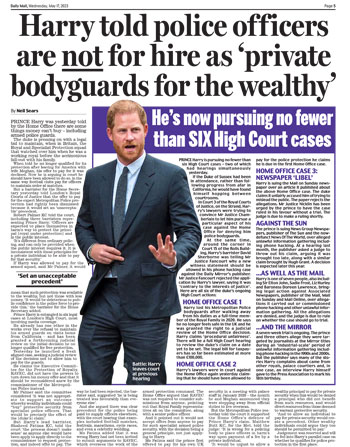
But, as the Mail reminded us yesterday, the Mirror case is just one of six in which Harry is involved at the moment. As well as challenging the Press, he is taking on the Home Office over his personal security. Two of these cases came to court simultaneously earlier this week. Having stepped back from “active duty” with the royal family, Harry is no longer entitled to police protection. He believes he still needs it and has offered to pay, but has been told no. On Tuesday, the Metropolitan Police told the High Court that it would be unjust to allow the rich and famous to buy police protection. This was offered on the basis of the risk to the individual, resources, and the public interest.
Funnily enough, there was more press interest in this case than in the ones in which newspapers are actively involved. It was the splash for the Sun yesterday and page 5 for the Mail and Telegraph. The Times put it on page 13, the rest had small stories or nothing.
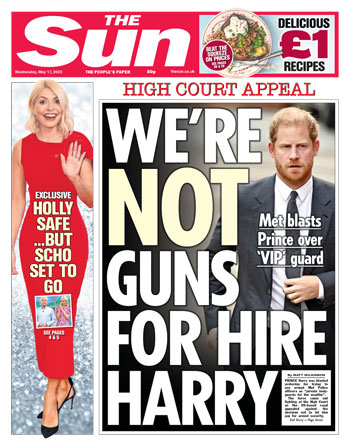
For the Sun and Mail at least, it was grist to the anti-Harry mill. For the vilification of Harry and his wife continues apace. The day after the coronation, the anti-Brexit author Edwin Hayward tweeted that he had logged more than 100 negative stories about the couple on the Express website in the space of 72 hours. The Sun and Star are withering, the Mail vitriolic. These papers know full well that the Press has hounded Harry since boyhood and that he blames the tabloids for the death of his mother. But now they brush all that aside as “other people” and “all in the past”. It is absolutely in all of their interests to discredit the duke as he stands up to them in court – and they are doing their damndest to avoid letting their readers know why.
Last night, however, the papers found themselves in a quandary after the Sussexes said that they had been involved in a two-hour “near catastrophic” car chase at the hands of “highly aggressive” paparazzi in New York. Meghan’s mother, Doria, had been in the car with them and had been “terrified”, the couple’s spokesman said. If this were true, then it would bolster all Harry’s arguments about press intrusion – if newspapers didn’t buy the pictures, there’d be no market – and about his security needs and reinforce his oft-repeated concerns that his mother’s history could repeat itself. But there was no video evidence, not enough people coming forward to back or dispute the claims. There was definitely a pursuit of some kind, but the New York police were of the opinion that it hadn’t been quite as dangerous as the Sussexes spokesman suggested.
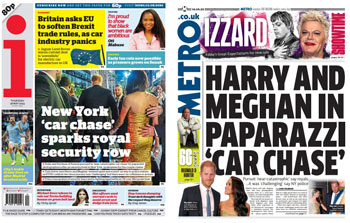
What to do? Most used the couple as their front-page image on the front. Metro and i splashed on it, while the Sun and Mirror gave the incident the least attention, pushing it back to an inside right-hander. The Express, Guardian and Telegraph had inside spreads, the Mail a full page, followed by a spread on Meghan (in a £9,000 golden outfit) and her mission to “rescue Brand Sussex”, the Times the best part of a page, which – like the Guardian’s spread – also included yesterday’s hacking trial evidence.
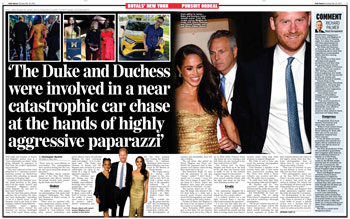
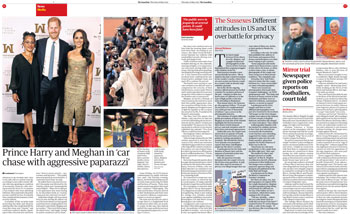
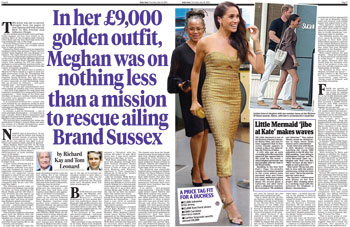
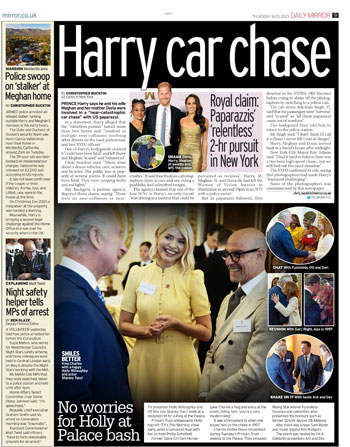
In this, the whitetops took – for them – a novel approach: they told the story in “conventional” style: putting the central assertion first – making sure prominently to attribute the claims to a Sussex spokesman – and then injecting a dollop of doubt from the police. My suspicion is that the scepticism will (perhaps rightly) grow in the coming days and the likes of Vine, Feltz and Moir will be opining. The Telegraph apparently doesn’t share their patience. It waded straight in with a column from Camilla Tominey headlined “A gap between fantasy and reality that you could drive a car through”. The Star, which makes a point of ignoring but not ignoring the couple, pushed the story back in line with the other redtops, but made no secret of what it thought with the headline, “Some recollections may very well vary…”
Coronation overkill
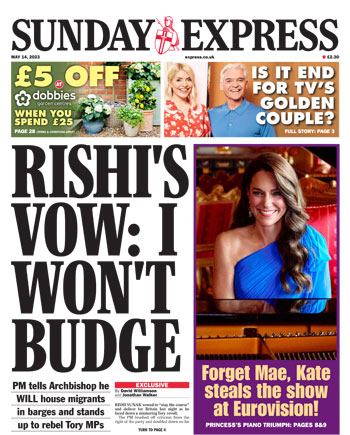
In the meantime, the beatification of the Princess of Wales also continues apace. She’s been on our front pages twice this week – once playing the piano for Eurovision and once in Hi de Hi yellow jacket saying she was still learning how to be royal. You might think that after the Coronation, the papers might ease up on the family, but maybe circulations rose and they think they are on to a good thing and want to keep the golden goose laying. We know that, historically, Diana was brilliant for sales, but is that still the case? Most papers keep their circulation figures close to their chests these days, so we’ll probably never know for sure, but I rather doubt the family still has the allure of the past.
I’m no republican – I think the royals are a net asset for the country – but I can’t help thinking “bread and circuses” as we are force-fed endless sentimental twaddle about glory and nobility and majesty. I know we haven’t had a coronation for 70 years, but last time, it was of a beautiful young woman who symbolised the dawn of a hopeful new era after a ghastly war. This time it was a man in his mid-seventies who cannot possibly symbolise a fresh start. Maybe I’d have felt differently had it been William and Kate, rather than Charles and Camilla, but for me personally, the whole event was not an opportunity to celebrate what was to come, but a reminder of what we had lost with the death of the Queen.
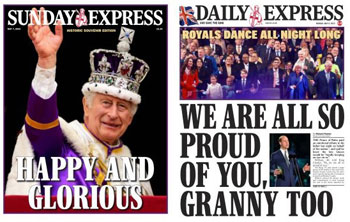
Such thoughts are anathema for the Press. How unpatriotic! Of course, they ran page after page, countless magazines, specials, pullouts and supplements. The Mail on Sunday had 63 pages – yes, 63 – before it got to anything else. The only other “news” in the paper being a spread on “cocky Keir” and the “Starmer nightmare” waiting to happen and a small page lead on Carol McGiffin being “axed” from the Loose Women TV show over her Covid conspiracy views. The front page promised “breathtaking pictures” and “the finest writing”, but perhaps not the finest headline writing: the splash's preposterous and presumptuous attempt at mind-reading was enough to put you off your muesli.
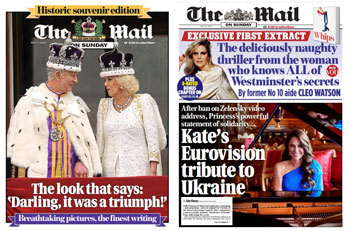
The Sunday Express was more restrained. It had only 41 pages before it reached its four “news” pages, which at least had a bit more breadth, with the local election aftermath, NHS strikes, student exams and Putin’s victory parade.
The Mirror and People didn’t manage a single non-coronation news page between them and the royal spreads included some that bore an uncanny similarity to those in the sister paper. Well, let’s not beat about the bush, 23 of the 28 inside pages were identical, apart from the branding, while two spreads had slightly different headlines on the same design. Oh, and the Mirror had one extra page of editorial where the People had a full-page ad. Synergies, don’t you know.
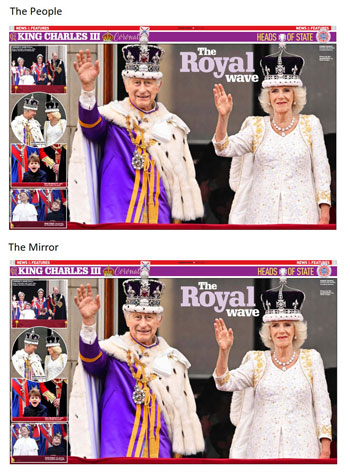
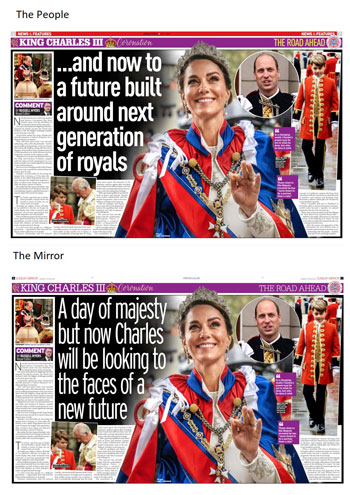
This drenching was expected, likewise the reams of newsprint expended on the occasion for the Mondays. With the exception of the i and Guardian, they all ran their royal coverage straight through from page 1 without pausing to offer anything else; the Telegraph had only two domestic and two world news pages without a royal on them. (But coverage of the protests and the arrests over paint and rape alarms that were never found? Don’t get me started.)
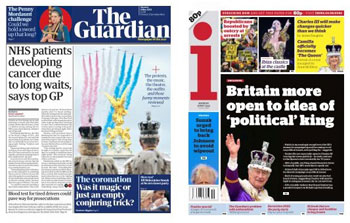
I understand all that, but surely by Tuesday, it was time to rein (not reign) back? But no, here’s a portrait of the King in all his finery. This occupied the entire front page of the Express, Sun and – in my view, unforgivably – the Times. The Telegraph, Mirror and Mail all had huge pictures, but did at least manage to get some copy on the page as well.
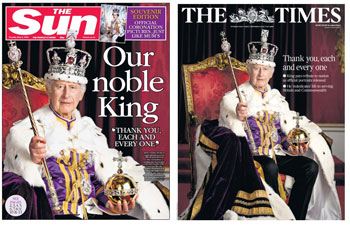
And there was more. Come the weekend, another official photograph was released, this time of the King with William and George. The Sun, Mail and Telegraph all captioned / headlined this “We Three Kings”, which might be ok when it becomes an historic picture to be dug up for George’s coronation, but does seem to be tempting fate a bit just now. When I did a trial shift at The Times the day after the first Charles wedding, one of the first things I noticed was a memo stuck on the noticeboard (remember them?) instructing subs: “Do not refer to Lady Diana Spencer as the future Queen of England”. How right, how right.
This time, too, I think the Times was wiser than its rivals in opting for the kicker “Long to reign over us”. A question mark would have made it perfect.
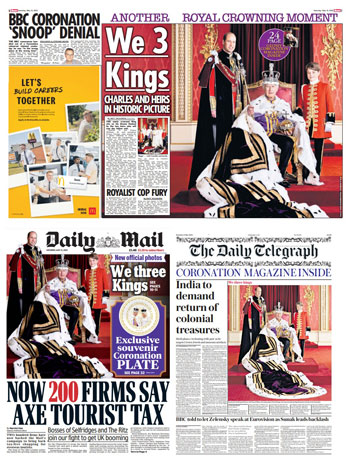
Blaming the Blob
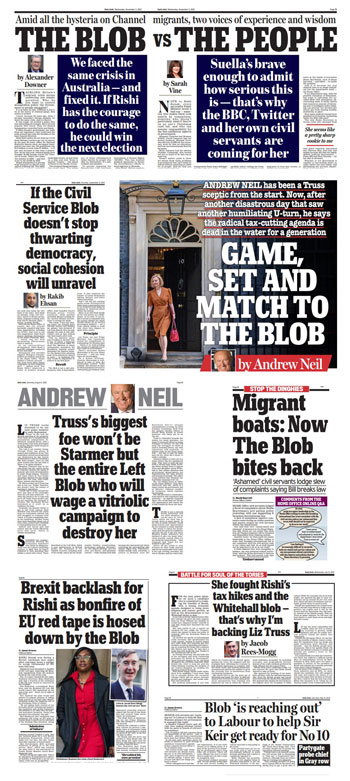
There was something even more pleasing that that from the Times yesterday – a column by Danny Finkelstein railing against Conservatives blaming the “Whitehall blob” for everything that doesn’t go their way.
Michael Gove has been credited with coining the phrase during the coalition government to encompass people in the education establishment who he felt were blocking his attempts at reform. It was seen as a reference to an old Steve McQueen sci-fi film and has since been widened (like the “wokerati” and the “anti-growth coalition”) to include anyone, but specifically civil servants, seen as standing in the way of Conservative agendas. Paul Dacre is very anti-Blob and blamed it in a letter to the Times for his failure to secure the chairmanship of Ofcom. The Mail, and Andrew Neil in particular, are constantly reminding readers of its pernicious influence.
How refreshing, then, to read Conservative peer Finkelstein tell them all – including his former colleague Gove – to stop it. Here’s an extended taster:
“It is the civil service and lawyers and "activists" and the EU and people with degrees and people who live in cities (and you, if I understood the last couple of days of Tory debate properly, because you aren't having enough children). This is the Blob. And the Blob is to blame for everything. There's no point saying the Tories, being in power, should have solved this or that problem. Because the Tories aren't in power, you see. The Blob is.
“This is how the home secretary gets to make big platform speeches criticising the policies and lack of achievement of the home secretary.
“The Blob has been cited as stopping the government from preventing illegal migration in small boats; the Blob did in Dominic Raab; the Blob forced Kemi Badenoch to change course on EU legislation. The Blob has appeared in speeches, in comments to newspapers, in headlines, in parliament and in letters to party members appealing for their support with an attack on the government's own employees.
“The Blob is not only a flight from reality but also a flight from responsibility. Because the Blob is too big, too powerful, too hungry ever to be defeated. So, no failure can ever be your fault. You tried your best but it was the Blob, you see. Blame ‘them’.
“To blame your own workers, public servants who work for you and whom you are supposed to manage - people whose welfare and output are your responsibility - is disgraceful. To argue that there is some vague jelly-like substance that makes progress impossible is defeatist.
“The Blob is the language of protest, not of government. It is the language of opposition. And that is where it is taking those people who use it.”
Hurrah!
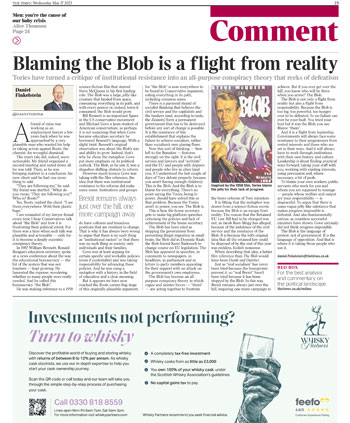
In other news

Sometimes it feels as though the royals and migration and Brexit are all our papers have to offer, but last week a couple of other stories broke through: Trump being branded a sex offender by a court and Britain sending cruise missiles to Ukraine. Well, sort of broke through. The Trump case made the splash for the Guardian, Telegraph and Mail, but only the Guardian paid much attention to the missiles.
This, from a Western perspective, was possibly the scariest development of the war. It could conceivably lead to Nato becoming involved in the conflict with all the ramifications that would bring. I don’t recall any debate about whether we should take this step, or any of the usual pre-announcements we are used to – as in “ministers are considering…”, “ministers will today…” It was just presented as a fait accompli and reported on page 13 of the Times and on the foreign pages of the Telegraph. They both put Zelensky saying Eurovision should have been held somewhere closer to Ukraine further forward. Weird priorities. I suppose I should be grateful that the coverage wasn’t full of “Isn’t Britain wonderful”, “look how we’re leading the way” self-aggrandisement, but I find the casual acceptance of the development worrying.
Front page of the fortnight
There’s no escaping the coronation for this one. I liked this for its clean simplicity.
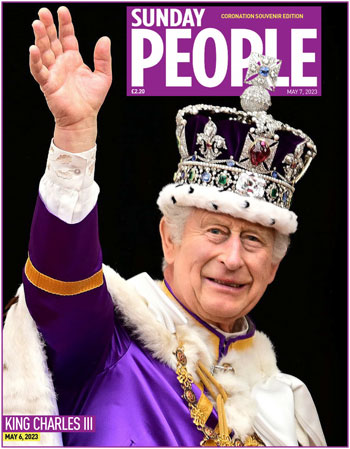
Liz Gerard’s Notebook is a fortnightly column published in the InPubWeekly newsletter. To be added to the mailing list, enter your email address here.












